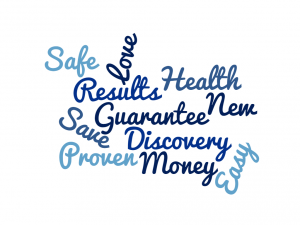
Marketers are continually looking for ways to engage their audiences with powerful, impactful content. As creatives produce what they hope will be meaningful messages that resonate with readers, they need to create word-pictures or mental images. Here is a list of the most persuasive words to help accomplish those goals.
Hard-hitting words
1. You: People like to read about themselves, so if you are not using their name directly, “you” is better than “I”, “we” or “our.” If asked the question who is the most important person in the world, the answer is always “you” not “me.”
2. Save: People have an innate desire to get a bargain. If content shows readers they are saving time, money or resources, it will have a great appeal.
3. New: This is an excitement-generating word. People like to buy products and services that are innovative, state-of-the-art and not previously available. It gives them a sense of being ahead of the curve.

4. Discovery: Like new, discovery is an upbeat word. It implies finding something new, something of value or a solution that didn’t exist before. Whether the discovery refers to a new medical procedure, prescription drug, archaeological find or new technological advancement, it appeals to a person’s desire to improve the status quo.
5. Proven: While some people might think this is an overused word, especially when it comes to “proven-effective,” it is a word that helps with the decision-making process. It provides readers with the reassurance they need to make a positive buying decision.
6. Results: One definition of results is “a consequence, effect or outcome of something.” Potential buyers and users of products and services want to be reassured that their purchases will deliver on the promises the seller makes. This represents an inherent desire for data—statistical proof that the purchase can deliver an expected ROI.
7. Money: Money in and of itself doesn’t have value, however it is what money can do for you that is important. At its core, it provides freedom, a measure of success, the ability to solve a problem or the accumulation of something that is important to you. It’s what you can buy with money that makes it a key word in the content-development process.
8. Health: When a product or service contributes to physical or mental health, it creates value. It represents satisfaction of emotion, which is a strong buying motive. All people (and the companies they work for), have a desire to lead long, productive, successful lives, so any reference to sustaining health contributes in a positive way to this goal.
9. Love: Similar to (good) health, everyone seeks love. If content developers can show that a product or service results in more love, joy, fulfillment, they will appeal to readers. It is a word that creates a powerful visual image. For example, taking a Hawaiian vacation is something many people would love to do.
10. Easy: It’s an innate desire for people to want things that are easy…easy to do, easy to use, easy to make. Have you ever heard someone say, “I really want to buy that product if it is difficult or complicated to use.” Probably not. Why? Because when things are easy, they save time, energy and resources.
11. Safe: This word is important because it implies freedom from harm, injury, danger or risk. In a world that is continually threatened by terrorism, natural disasters, political corruption, products or services that increase a person’s sense of well-being are important and powerful.
12. Guarantee: Like “results” and “safe,” “guarantee” takes the risk out of doing business. It is a promise that a seller makes to a buyer that provides a sense of security and gives assurances that a product or service will deliver on its claims.
Use persuasive words

Savvy marketers understand how language can influence emotion and motivate people to action. Of course, some words work better than others depending on the circumstances. But just for fun, try to create a sentence using as many of these persuasive words as possible.
